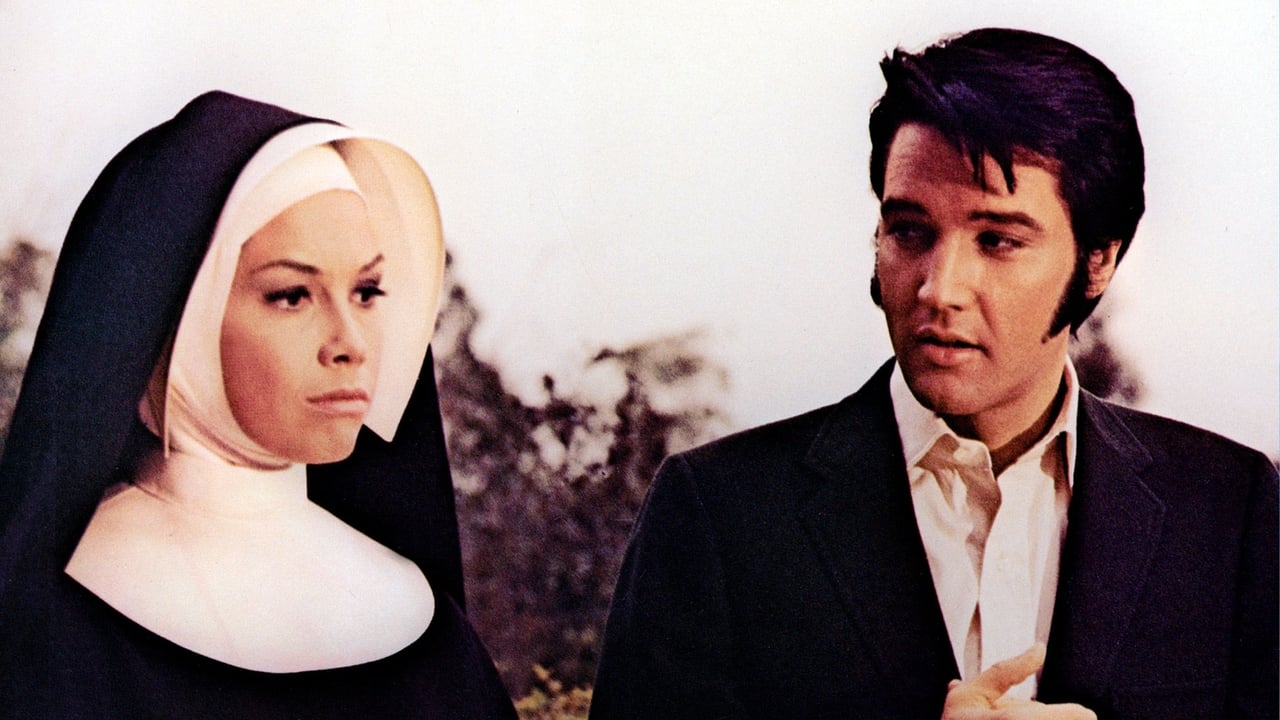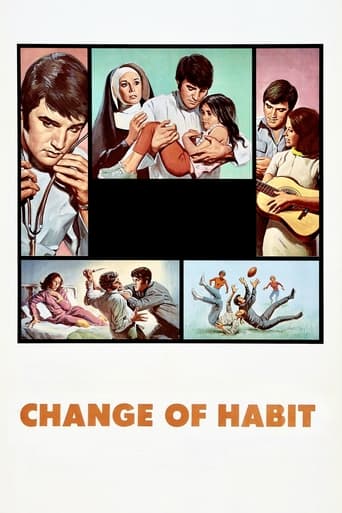WillSushyMedia
This movie was so-so. It had it's moments, but wasn't the greatest.
Claire Dunne
One of the worst ways to make a cult movie is to set out to make a cult movie.
Marva-nova
Amazing worth wacthing. So good. Biased but well made with many good points.
Cassandra
Story: It's very simple but honestly that is fine.
zardoz-13
Elvis Presley's last movie "Change of Habit" qualifies as a tolerable romantic comedy wrapped up in a social welfare saga. The King is cast as Dr. John Carpenter, and he runs a medical clinic on Washington Street where people live in poverty. A loan shark known as the Banker operates the drug franchise. He believes that he is above the law. Three nuns on a secret mission to serve as Dr. Carpenter's nurses show up without their habits. Mary Tyler Moore as Sister Michelle, Jane Elliot as Sister Barbara, and Barbara McNair as Sister Irene encounter initial disapproval from the urban community as they arrive without their uniforms. At first, Carpenter thinks that they are looking for an abortionist when they inform him that they are his nurses. Most of Carpenter's patients are blue-collar, working stiffs and their families. Carpenter struggles to connect with Michelle. Little does he know about her vows, and she has a tough time dealing with him. Sister Irene makes house calls and decides to intervene in community affairs. Local black activists challenge Irene, and she aligns herself with them. Meantime, Sister Barbara battles against the high prices at the local grocery store that blacks must pay. Eventually, she forsakes her robes to plunge into local politics. Sadly, Carpenter never realizes his dream. Michelle doesn't forsake her vows to a celestial God for a physical pleasure. Along the way, Michelle helps a little girl who may be afflicted with autism. You won't find the usual bikini-clad babes in "Change of Habit." Unlike his early movies when he played a troubled youth, Presley plays a cool, calm authority figure here. Nothing about this movie truly stands out. Elvis dresses rather up-scale for a doctor in the ghetto. Regis Toomey plays an antagonistic priests who butts head with our three heroines. Elvis wades into one open-air celebration, but the police don't arrest him. Altogether, "Change of Habit" is more about the nuns than Elvis.
JLRMovieReviews
In one of his later films, Elvis Presley plays a doctor in a rough part of town and has requested some nurses who can handle themselves. What he didn't expect was that they would turn out to be nuns, but he is not told that in the beginning. Mary Tyler Moore, Barbara McNair and Jane Elliott are the nuns, who dress without their habits to be a part of the people and not be treated differently. Of course there is animosity and attraction between Mary and Elvis, and, while that is a subplot that is always there, it takes the back burner to the patients, including a young girl who's autistic and a young man who stutters and is a little disturbed and has a way with knives. This is better than it sounds, due in part to their compassion for their patients, therefore making the characters very real and three-dimensional. Jane Elliott and Barbara McNair give good support and deliver their line with much zest and pizazz. What really hurts the film in my opinion is the music. I think the film's dramatic impact would have been strengthened by the lack of music and the songs, while upbeat, tend to be rather corny in this tough neighborhood. While it would have been a good drama, it was only slowed down and made a bit odd by the use of music in the film. One can only think that they inserted songs to not disappoint Elvis die-hard fans, expecting it. And another thing that hurts is the subplot of a Mr. Big, who you don't want to owe money to. That plot wraps up rather unbelievably. I think I read somewhere that Ms. Moore had to deflect Elvis' advances during the making of this film. "Change of Habit" makes for interesting drama with a few unnecessary songs and contains a rather unresolved ending concerning Mary and Elvis. Or does it?
preppy-3
Three nuns--Sister Michelle (Mary Tyler Morore), Irene (Barbara McNair) and Barbara (Jane Elliot)--dress up in everyday clothes and go to work at a free clinic in a terrible part of the city run by Dr. John Capenter (Elvis Presley). He doesn't know they're nuns and falls in love with Moore pretty quickly.This is a terrible movie--no two ways about it. The script is just pathetic--full of unfunny "humor", tired "hip" dialogue and insultingly dated social issues. Poor Elliot has the worst lines but she does wonders with them. Presley sings only four songs (none are bad but not memorable either) and his acting is LOUSY. No surprise that this was his last feature film. Moore and McNair are very good in their roles. Also there's an atrocious overdose of sexist lines, more than a few swipes at the Catholic church and questionable ways to deal with kids. One little girl is autistic so Presley and Moore hold her down, order her to be mad and while she screams and tries to get away they tell her they love her! This borders of child abuse! But hey it's OK cause--get this!--it CURES HER AUTISM!!! That part almost had me heaving the TV out the window:) The big question is can will Moore leave the order to join Elvis or not? Guess who wins? Well--the movie doesn't tell you! They leave it hanging! So it's lousy but it worked in a good/bad way:)Look for future MTM costar Edward Asner in a small role as a cop and 1950s star Richard Carlson as a bishop.
Brian Camp
I watched CHANGE OF HABIT for the first time on January 8th to commemorate the 75th anniversary of Elvis Presley's birth. It's quite a change of pace for the star, an attempt to mix social commentary with an Elvis musical. It doesn't quite work, largely because the script and the direction, products of the old Hollywood studio mindset, clash with the young performers and the ideas in the story that were clearly in sync with the tenor of the times. Had they gotten a younger, more innovative director, it might have worked. But that can be said about so many of Elvis's movies.The basic premise is sound. The three nuns in the film played by Mary Tyler Moore, Jane Elliot, and Barbara McNair have clearly defined professional skills and a strong commitment to using them to help the disadvantaged. The women are unquestionably sincere and quite admirable and courageous. Their characters provide the emotional core for the story of a free clinic operating in a multi-ethnic ghetto neighborhood. From a production standpoint, the casting direction and some of the background work offer an authenticity quite rare in a studio product of the time. Despite being shot largely on the Universal Studio backlot (the New York street set), the street life portrayed has a rhythm and level of noise and aggression that wasn't often convincingly captured in studio productions. There are a large number of black and Latino performers in the cast and not a single one of them looks like they stepped out of Central Casting. A cute Puerto Rican actress, Laura Figueroa, plays a 17-year-old street girl who has the hots for Elvis. One of the black militants who confronts Barbara McNair's Sister Irene is played by Ji-Tu Cumbuka, who went on to quite a number of important roles in black-themed films and TV shows (e.g. UP TIGHT, TOP OF THE HEAP, "Roots"). There's even a street fair with a Latin band that resembles events I used to attend in the South Bronx back in the day.The one significant false note in the casting is the inclusion of two stock old white lady characters (played by Doro Merande and Ruth McDevitt) who stick their heads out of the windows regularly to cluck their disapproval, as if they'd been held over from the Frank Capra road company. Hollywood veteran Regis Toomey (who was actually in a Capra movie, MEET JOHN DOE) is on hand as a grumpy old parish priest who antagonizes the nuns, but, to its credit, the film refuses to soften the character or make him one of those stock Irish priests with a kind word and a useful homily for every situation. Instead, he's presented as a man fearful of his parishioners and clearly out of step with the times. In another interesting casting touch, Ed Asner turns up as an enlightened beat cop who speaks Spanish to the street's residents. Cult favorite Timothy Carey (THE KILLING) plays a surly butcher who regularly cheats the customers.There are some alarming elements on display, though. In one scene the doctor played by Elvis takes a young autistic girl of about five or six into his arms and manhandles her in a bout of "tough love," urging her to get her "anger" out. To a modern viewer it looks an awful lot like child abuse. (As another comment here points out, this was an attempt to dramatize a now-discredited treatment method called "rage reduction therapy.") At one point, Elvis tries to dissuade the nuns from working in his clinic with a jaw-dropping line that has to be heard to be disbelieved: "The last three nurses who worked here couldn't take it. Two of them were raped, one even against her will." Later, an attempted rape of one of the nuns at knifepoint by a disturbed patient is brushed off quite casually. Maybe they assumed it wasn't "against her will." Also, this has to be the only Elvis film where you hear the words, "faggot," "bitch" and "nigger." (And it was rated "G," to boot!)While Mary Tyler Moore does an excellent job as Sister Michelle, who is torn between her love for Jesus and her love for Elvis, I can't be so generous in assessing Elvis' performance. He's quite charismatic, despite the inappropriate hairstyle and wardrobe, but he holds back in every scene. With a better script and direction, the role of an embittered Vietnam veteran who carries out his moral obligation to a dead soldier by becoming a doctor to help the poor could have been a breakout performance for the singing star. Instead, Elvis comes in, reads his lines with a minimum of involvement and refuses to express the emotions that the character must surely be feeling. What happened? Why didn't he step up to the plate and knock this one out of the park? He had it in him. Instead, this was his last acting job. All I see now is sad, wasted potential. It hurts.

